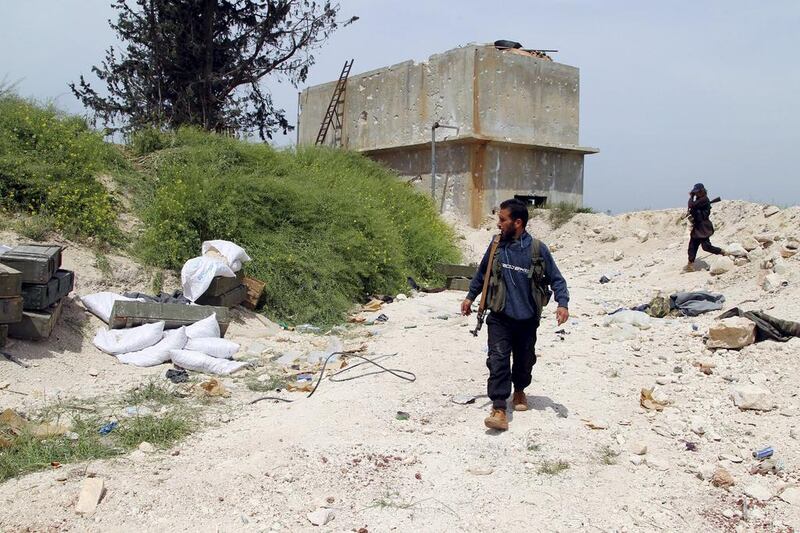Two recent developments in the region appear to have caused more damage to ISIL’s popularity and relevance than nine months of air strikes and battles in Iraq and Syria.
The first is the Syrian rebels' recent victories against Al Assad regime in northern, central and southern Syria. In the past four months, the anti-government forces have assumed control of key military bases (Wadi Al Dhaif, Hamidiya, Brick Factory), a provincial capital (Idlib), a strategic town (Jisr Al Shughour) and several villages in Hama. In the perception of many, ISIL is a has-been. In other words, the rebels have stolen ISIL's thunder.
But make no mistake, ISIL remains capable of holding on to its territory for years. Even so, it’s worth noting reports from the ground that the group is losing some of its appeal among new recruits. The appeal of ISIL is multifaceted and the fight against it should capitalise on any trend, no matter how insignificant, to undermine the group.
Several people inside Syria have told me that ISIL started to lose some of its sympathisers after the rebels swept through significant regime bases in recent months. Jamal Khashoggi, the prominent writer from Saudi Arabia, has spoken of the same trend on Twitter.
The second development that is damaging to ISIL is the campaign against the Houthi rebels in Yemen and the way that people across the region are reacting to it. There is a decided drop in positive mentions of the group. Those who once subtly cheered for ISIL have shifted to enthusiastic support for the campaign against what they perceive as Iranian proxies in Yemen. This attitude is discerned in that section of the region’s population that believes in ISIL’s political project. The energy that often favours ISIL has shifted towards something else, at a time when ISIL is losing ground to Iranian-backed Shia militias in Iraq.
It’s important to understand that this view of the situation comes amid the widespread belief that Saudi Arabia no longer perceives the Muslim Brotherhood as quite so much of a threat. This has created a sense of optimism and it is manifesting itself in public attitudes towards the campaign against the Houthis. It helps that some popular clerics loosely associated with the Muslim Brotherhood have become heavily involved in supporting the Saudi-led campaign in Yemen. Sheikh Mohammed Al Arifi from Saudi Arabia, for example, dressed as a soldier, joined Saudi soldiers near the Yemeni border and prayed for them.
The clerics’ public stance is in stark contrast to their timid response last year to the rising threat posed by ISIL. For months, ISIL seemed to many to be the most visible force fighting Iranian influence in the region. That won it support in some circles in the region but now that seems to be changing, with the Syrian rebels’ gains and the campaign against the Houthi rebels. The current military momentum of the rebel forces that fought against ISIL and expelled it from the north-west last year is hurting the extremist group more than recent defeats at the hands of Kurdish and Shia militias in Syria and Iraq.
Of course, that is not necessarily good news for everyone. Some take a dim view of “Sunni militarism”, whatever form it takes, as the alternative to ISIL. But this is one way to understand the regional appeal of groups such as ISIL and the popular response in some circles – subtle though it may have been – to ISIL conquests last year. And that’s why the rebels’ gains in Syria and the military campaign in Yemen are important. They are part of the Middle East’s polarised landscape, one in which ISIL and similar groups thrive.
These attitudes should be correctly channelled. In Syria, the most successful forces on the ground, from all sides, seem to be the most extreme. People long for victories and an end to the suffering, violence and oppression. They support extremist forces because they can strike at their enemies and inflict pain. But once in a while, they also show that they are willing to abandon extremist forces if the alternative can also achieve success. While outsiders view the forces that are winning against the Assad regime in the north as being just as extreme as ISIL, Syrians see them as their defenders.
The most effective way to fight ISIL is through forces that come from the same communities that produce some of the group’s recruits. Such forces must be fighting in the same territories and on behalf of the same communities that ISIL claims to represent. Only then can ISIL start to be rolled back.
Hassan Hassan is a Middle East analyst and co-author of ISIS: Inside the Army of Terror
On Twitter: hxhassan





